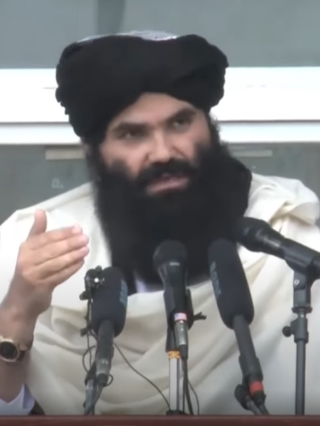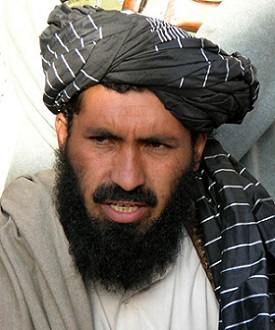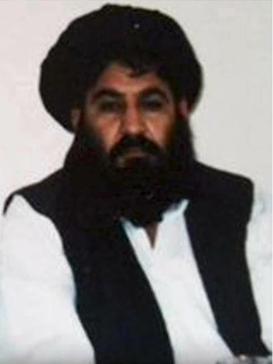Related Research Articles

Jalaluddin Haqqani was an Afghan insurgent commander who founded the Haqqani network, an insurgent group fighting in guerilla warfare against US-led NATO forces and the now former government of Afghanistan they support.

United Nations Security Council resolution 1267 was adopted unanimously on 15 October 1999. After recalling resolutions 1189 (1998), 1193 (1998) and 1214 (1998) on the situation in Afghanistan, the Council designated Osama bin Laden and associates as terrorists and established a sanctions regime to cover individuals and entities associated with Al-Qaida, Osama bin Laden and/or the Taliban wherever located.

Mohammed Abdul Kabir is a senior member of the Taliban leadership who has served as the acting third deputy prime minister for political affairs of Afghanistan since 4 October 2021. He previously was the acting prime minister of Afghanistan from 16 April 2001 to 13 November 2001.

Sirajuddin Haqqani is an Afghan warlord who is the first deputy leader of Afghanistan and the acting interior minister. He has been a deputy leader of the Taliban since 2015, and was additionally appointed to his ministerial role after the Taliban's victory over Western-backed forces in the 2001–2021 war. He has led the Haqqani network, a semi-autonomous paramilitary arm of the Taliban, since inheriting it from his father in 2018, and has primarily had military responsibilities within the Taliban.
The following lists events that happened during 1999 in Afghanistan.
Maulavi Ezatullah Haqqani is a citizen of Afghanistan identified as a member of the Taliban's leadership. He was described as being the Taliban's Deputy Minister of Planning in United Nations Resolution 1390. On United Nations Resolution 1267 the Taliban's Deputy Minister of Planning was listed simply as Maulavi Ezatullah.

The Pakistani Taliban, officially called the Tehreek-e-Taliban-e-Pakistan, is an umbrella organization of various Islamist armed militant groups operating along the Afghan–Pakistani border. Formed in 2007 by Baitullah Mehsud, its current leader is Noor Wali Mehsud, who has publicly pledged allegiance to the Afghan Taliban. The Pakistani Taliban share a common ideology with the Afghan Taliban and have assisted them in the 2001–2021 war, but the two groups have separate operation and command structures.

The Haqqani Network is an Afghan Islamist group, built around the family of the same name, that has used asymmetric warfare in Afghanistan to fight against Soviet forces in the 1980s, and US-led NATO forces and the Islamic Republic of Afghanistan government in the 21st century. It is recognized as a terrorist organization by the United Nations. It is considered to be a "semi-autonomous" offshoot of the Taliban. It has been most active in eastern Afghanistan and across the border in north-west Pakistan.

Maulvi Nazir was a leading militant of the Pakistani Taliban in South Waziristan. Nazir's operations were based in Wana.

The Leadership Council of the Islamic Emirate of Afghanistan, also translated as the Supreme Council, is an advisory council to the Supreme Leader of Afghanistan. The supreme leader convenes and chairs the council at his sole discretion. He has ultimate authority and may override or circumvent it at any time. It played a key role in directing the Taliban insurgency from Quetta, Pakistan, which led to it being informally referred to as the Quetta Shura at the time.
The Taliban appointed Maulavi Shafiqullah Mohammadi as the Governor of Khost Province in January 2000. According to the Agence France Presse his appointment represented the first time the Taliban had replaced a Governor due to his unpopularity. Residents of the Province had participated in rare public anti-Taliban demonstrations in the weeks leading up to Mohammadi's appointment, claiming the former Governor had been improperly selling off public property for personal gain.
Maulvi Mullah Abdul Baqi is a senior Taliban official.

Akhtar Mohammad Mansour was the second supreme leader of the Taliban. Succeeding the founding leader, Mullah Omar, he was the supreme leader from July 2015 to May 2016, when he was killed in a US drone strike in Balochistan, Pakistan.

The Islamic State – Khorasan Province (ISIS–K) is a regional branch of the Islamic State terrorist group active in South-Central Asia, primarily Afghanistan. ISIS–K, like its sister branches in other regions, seeks to destabilize and overthrow existing governments of the historic Khorasan region in order to establish an Islamic caliphate under its strict, fundamentalist Islamist rule.
Gul Agha Ishakzai, also known as Mullah Hidayatullah Badri, is a politician in Afghanistan. As of March 2023, he is serving as the acting chief of Da Afghanistan Bank. Prior to that he served as the country's Finance Minister.

International sanctions against Afghanistan were implemented by the United Nations in November 1999. The sanctions were aimed at terrorists, Osama bin Laden and members of Al-Qaeda.
Khalil-ur-Rahman Haqqani, also known as Khalil-ur-Rehman Haqqani, Khalil al-Rahman Haqqani, Khaleel Haqqani and Khalil Ahmad Haqqani, is the Afghan Minister of Refugees and a prominent leader of the Haqqani network.
References
- 1 2 3 4 5 6 7 8 9 Amir Mir (25 November 2013). "Who was Maulvi Ahmad Jan, the droned Haqqani leader?". The News International. Archived from the original on 5 December 2013. Retrieved 5 December 2013.
- ↑ "Security council committee on Afghanistan designates further individuals, financial entities relating to resolution 1267 (1999) and 1333 (2000)". United Nations. 12 April 2000. Archived from the original on 11 August 2009.
In a note verbale addressed to Member States on 12 April 2000, the Security Council Committee established pursuant to resolution 1267 (1999) concerning Afghanistan designated funds and financial resources of the Taliban as per paragraph 4(b) of that resolution and approved a list of entities and/or persons that have so far been identified by the Committee based on information provided by Member States as falling under one of the categories mentioned in the above note, as well as in Press Release SC/6844. The following entities have been added to the list ... Maulavi Ahmad Jan, Governor of Zabol Province
- ↑ "Security Council Committee established pursuant to resolution 1267 (1999) concerning Al-Qaida and the Taliban and Associated Individuals and Entities". United Nations. 15 October 1999. Archived from the original on 12 June 2010.
- ↑ "The Consolidated List established and maintained by the 1267 Committee with respect to Al-Qaida, Usama bin Laden, and the Taliban and other individuals, groups, undertakings and entities associated with them". United Nations. 25 January 2010. Archived from the original on 6 March 2010.
TI.A.109.01. Name: 1: AHMAD JAN 2: AKHUNZADA 3: na 4: na Name (original script): احمد جان آخوند زاده Title: Maulavi Designation: Governor of Zabol Province under the Taliban regime DOB: na POB: Urazgan province, Afghanistan Good quality a.k.a.: na Low quality a.k.a.: na Nationality: Afghan Passport no.: na National identification no.: na Address: na Listed on: 25 January 2001 (amended on 3 September 2003, 21 September 2007) Other information: na
- 1 2 Amir Mir (1 March 2010). "Pakistan wipes out half of Quetta Shura". The News International. Archived from the original on 9 March 2010.
According to well-informed diplomatic circles in Islamabad, the decision-makers in the powerful Pakistani establishment seem to have concluded in view of the ever-growing nexus between the Pakistani and the Afghan Taliban that they are now one and the same and the Tehrik-e-Taliban Pakistan (TTP) and the Quetta Shura Taliban (QST) could no more be treated as two separate Jihadi entities.
- 1 2 3 S.B. Shah (21 November 2013). "US drone strike kills senior Haqqani leader in Pakistan". Agence France-Presse. Archived from the original on 24 November 2013. Retrieved 5 December 2013.